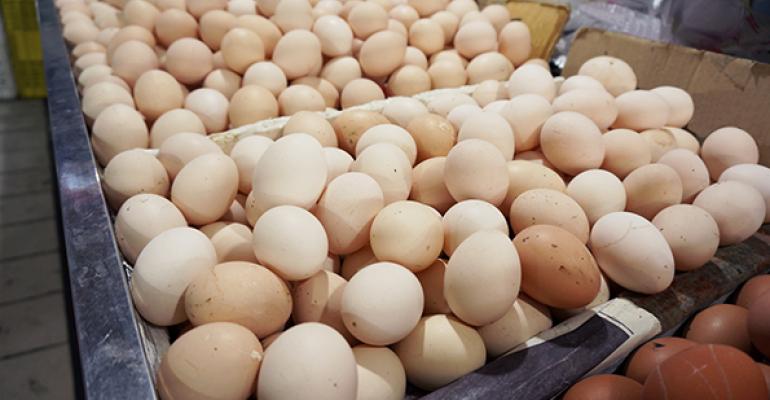Whataburger Restaurant LLC’s decision to shorten its breakfast hours in response to a nationwide egg shortage is likely just the first response by restaurants to an avian influenza outbreak that has devastated egg-laying hens, according to supply chain experts who expect the shortage to last well into 2016.
“Our egg supply is quite the challenge, no question about it,” said DeWayne Dove, vice president of risk management for SpenDifference, a Denver-based purchasing cooperative.
Dove said the outbreak of the H5N2 virus, mostly in the Midwest and especially in Iowa and Minnesota, has resulted in the destruction of 44 million birds, or 13 percent of the total domestic flock of egg-laying hens, as well as 4 percent of the turkey flock.
Meat chickens, which are raised in other parts of the country, have been largely unaffected.
Brian Miller, vice president of services at Intesource, a Phoenix-based online sourcing platform, said “breaker eggs,” or those used for liquid eggs, have been hit particularly hard, with the supply down 25 percent. Wholesale prices for liquid eggs have nearly tripled, he said, from from 63 cents a dozen to $1.83 a dozen, while shell egg prices have jumped by about 70 percent from $1.19 a dozen to $2.03 a dozen.
Dove said he has seen shell egg prices more than double in the past two months, but there’s a risk of restaurants not being able to get all the eggs they need.
“Food cost is a very important issue right now, but really the severity is more about supply,” he said.
The outbreak is believed to have been caused by migratory Canada geese and other waterfowl over the Midwest, Dove said.
“What the industry is anticipating is with warmer weather we’ll see a slowdown of outbreaks,” he added, noting that, according to current science, the H5N2 virus begins to spread less effectively at 65 degrees Fahrenheit and becomes completely ineffective at 85 degrees Fahrenheit.
Although the outbreak appears to be winding down, Dove said estimates of the amount of time it will take to rebuild the flock range from six months to 18 months, “just because of the turnaround time to destroy infected birds, get the plants sanitized and get the USDA approval to be up and running.”
On top of that process, it takes five months from the time an egg starts gestating until it hatches into a female chick and matures into an egg-laying hen.
Dove said suppliers are exploring options to import eggs, but Miller noted that Mexican birds are also affected by avian flu, and Canadian eggs are also in short supply. He added that although options are being explored to import eggs from Europe, protocols to do so aren’t in place.
Foreign plants processing food for export to the United States must be approved by USDA inspectors, and trade agreements may also need to be made. The process can take months or even years.
Dove noted that there have also been supply issues with turkey breast, “but it’s nowhere close to what we’re seeing in the egg business,” although prices have risen as much as 40 percent.
Chicken prices, meanwhile, have fallen, except for wings, he said, which are mostly consumed domestically.
Deemphasizing eggs on the menu
“We’ve seen a tremendous decline in exports around our domestic chicken,” he said. “So that’s created a tremendous amount of supply, which has driven prices down.”
Chicken breast prices have declined by as much as 10 percent, he said.
Bruce Reinstein, chief operating officer of Consolidated Concepts, a purchasing partner for chains and other foodservice operations, said operators should expect egg supply to be a challenge for at least the next eight months, and they should adjust accordingly. That includes considering switching from liquid eggs, which have been hardest hit by the outbreak, to shell eggs, and reformulating any limited-time offers that contain eggs.
He also suggested redesigning menus to deemphasize eggs.
“If eggs are the first thing people see on a menu, you’ve got to move them,” he said.
Additionally, restaurants with breakfast buffets should consider rearranging what they offer.
“Typically, because they’re usually inexpensive, scrambled eggs are first,” he said. “Now, maybe put French toast and pancakes first, and move the scrambled eggs farther down to where there’s no more room on the plate for them.”
He also suggested shortening breakfast hours, like Whataburger did.
Whataburger reduced its breakfast hours to 5 a.m. to 9 a.m. on weekdays and 5 a.m. to 11 a.m. on weekends. Previously, breakfast was available from 11 p.m. to 11 a.m. daily.
Dove and Miller also said operators must consider new sources for egg-heavy items, such as mayonnaise and baked goods. Dove suggested that research and development teams work to develop alternatives to those items. Miller said egg-free mayonnaise and cake mixes are available and should be considered.
Contact Bret Thorn at [email protected].
Follow him on Twitter: @foodwriterdiary





